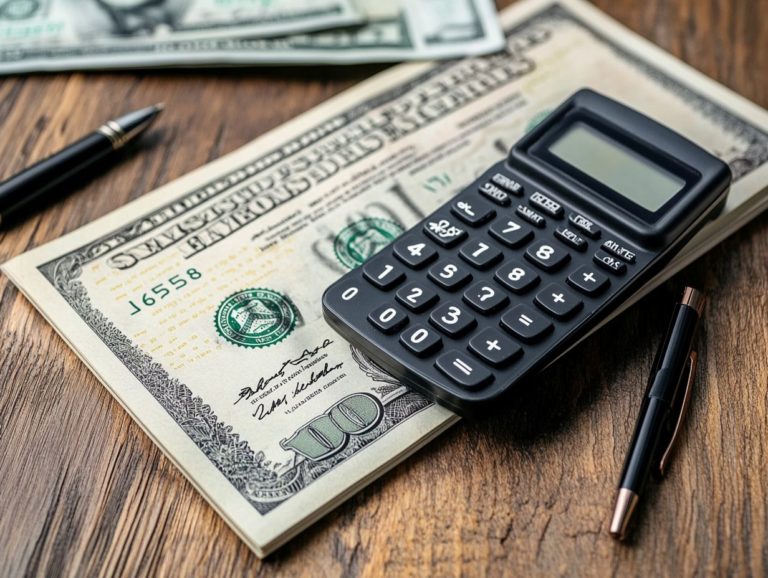Leasing vs Buying: Which is Right for You?
When it comes to acquiring a vehicle, the choice between leasing and buying can feel overwhelming. Each option presents its own unique advantages that impact your finances and driving experience.
Let s delve into the benefits of leasing, such as lower monthly payments and reduced maintenance costs. We will also examine the perks of buying, including ownership and the freedom from mileage restrictions.
Key factors will be explored to guide you in making the best choice for your lifestyle and needs.
Together, we’ll uncover the best options for you, ensuring you hit the road with confidence and excitement!
Contents
Key Takeaways:

- Leasing offers lower monthly payments and less maintenance costs, but you don’t own the car.
- Buying allows ownership and no mileage restrictions, but monthly payments and maintenance costs may be higher.
- Consider your financial situation and driving habits when deciding between leasing and buying a car.
Explaining the Difference
When weighing the decision to lease or buy a car, it s crucial for you to grasp the fundamental differences between these two options. Each path offers distinct benefits and financial implications that can profoundly influence your vehicle ownership experience.
Leasing often provides the advantage of lower monthly payments and reduced upfront costs. In contrast, purchasing a vehicle typically leads to eventual ownership and the potential for equity.
Considerations such as insurance requirements, mileage limits, and maintenance responsibilities are important for your decision between leasing and buying a car.
Benefits of Leasing
Leasing a car presents a wealth of advantages that cater perfectly to budget-conscious individuals seeking flexible transportation options. It s particularly appealing for those who prefer to enjoy the latest vehicles equipped with cutting-edge technology without the long-term commitment of ownership.
One of the most enticing benefits of leasing is the considerably lower monthly payments compared to purchasing a vehicle. This allows you to save on both upfront costs and overall spending. Moreover, leasing tends to alleviate maintenance worries since most leased cars are new and still under warranty, significantly reducing your out-of-pocket expenses.
Lower Monthly Payments
One of the main reasons you might lean towards leasing instead of buying is the significantly lower monthly payments that come with leased vehicles. This option is particularly attractive for those who want to minimize financial burdens without sacrificing the pleasure of driving a new car.
The appeal lies in the fact that lease payments are primarily based on the vehicle’s depreciation (the decrease in value over time) over the lease term, rather than its total purchase price.
Consequently, you ll often find that your monthly financial commitments become far more manageable compared to traditional financing. This lower payment structure allows you to drive higher-end models that may have felt out of reach if you were buying, freeing up funds for other important expenses.
Plus, since leasing typically includes service and warranty coverage, you can sidestep unexpected repair costs. With market values constantly shifting, leasing gives you the flexibility to adapt to new models and features without the long-term commitment of ownership, making it an appealing choice for budget-conscious drivers like you.
Less Maintenance and Repair Costs
Leasing a vehicle often leads to lower maintenance and repair costs for you. Leased cars are typically newer models still under warranty. This means many repairs can be covered at no extra cost. You can enjoy peace of mind regarding unexpected expenses tied to vehicle upkeep, creating a more financially manageable ownership experience.
Newer vehicles come packed with the latest technology and safety features. This further minimizes the chances of issues cropping up. Most leasing agreements include routine maintenance packages, ensuring that essential services like oil changes and tire rotations are taken care of without any additional charges.
As a result, the overall financial burden of vehicle ownership is significantly reduced. This allows you to allocate your resources to other priorities.
By opting to lease, you can enjoy the benefits of a modern vehicle without the long-term commitment and financial responsibilities that come with ownership.
Benefits of Buying

Purchasing a vehicle offers a multitude of advantages for those seeking a long-term investment and the satisfaction of complete ownership. This choice gives you the power to take greater control over your financial decisions related to equity, expenses, and insurance.
When you invest in a car, you’re not just acquiring a mode of transportation; you’re building an asset that can appreciate over time. You have the potential to see financial returns if you choose to sell or trade in your vehicle down the line.
Ownership and Equity
A key advantage of purchasing a vehicle is the ownership it offers. This allows you to build equity as the car s market value fluctuates over time. This can greatly impact your finances.
Once you ve paid off your loan, the vehicle is entirely yours. You can capitalize on its resale value or trade-in potential.
Vehicle ownership acts as a means of building your assets. As equity builds, your vehicle can become a vital financial asset for future planning. You can secure loans against its value or use sale proceeds to fuel other investments.
By understanding depreciation, which is how much value your car loses over time, and market trends, you give yourself the power to make informed decisions. This ensures you maximize the financial returns on your investments. In essence, ownership cultivates a sense of independence and utility, positioning you for greater financial stability in the long run.
No Mileage Restrictions
One significant advantage of purchasing a vehicle is the freedom from mileage restrictions. Unlike leasing agreements, which often come with limits that can lead to pesky additional fees if exceeded, owning your vehicle allows you to drive as much or as little as you desire. You can hit the open road without worrying about extra financial penalties for exceeding your mileage.
The absence of mileage caps is vital when considering the long-term implications of vehicle ownership. It ensures you have the freedom to explore, travel, or commute without constraints. This flexibility is especially important for those with active lifestyles or lengthy daily commutes, where surpassing lease mileage limits can be all too easy.
Owning a vehicle lets you keep its resale value, which offers potential financial benefits in the future. Driving without restrictions enhances your ownership experience and gives you the power to fully utilize your investment without the stress of hidden costs or penalties lurking around the corner.
Factors to Consider When Choosing Between Leasing and Buying
When contemplating whether to lease or buy a vehicle, you must carefully consider several critical factors. These include your financial situation, driving habits, and personal preferences regarding ownership and long-term investment.
By understanding how these elements influence your decision-making, you can arrive at a more informed choice that seamlessly aligns with your lifestyle and financial aspirations.
Financial Situation
Your financial situation is key in determining whether leasing or buying a vehicle is the right choice for you. It directly impacts how you manage expenses, monthly payments, and any long-term commitments. By understanding your budget and financial capacity, you can make a decision that aligns perfectly with your monetary needs and lifestyle.
When weighing your options, consider factors like the initial down payment, which can differ significantly between leasing and purchasing. Leasing often comes with a lower upfront cost, making it appealing if you’re working with a tighter cash flow. However, those monthly lease payments can add up over time, potentially resulting in higher overall expenses compared to owning a vehicle outright.
On the other hand, purchasing a vehicle offers long-term financial benefits, such as building equity, meaning the car gains value over time. This can be a valuable asset down the road. Aligning your financial goals with your decision-making process is essential for achieving the best possible outcome.
Driving Habits and Needs

Assessing your driving habits and needs is essential when deciding whether to lease or buy a vehicle. Factors such as your typical mileage and how often you use the car will significantly impact your overall expenses and satisfaction. By understanding your driving patterns, you can choose the option that truly aligns with your lifestyle.
If you drive extensively for work or family commitments, purchasing a vehicle might be the more suitable choice. Buying often accommodates higher mileage without penalties, allowing you the freedom to drive as needed.
If your vehicle use primarily involves shorter commutes, leasing could be more advantageous. It offers the flexibility to enjoy a newer model every few years while keeping your monthly payments lower.
Financial implications also play a crucial role in your decision. Buying typically involves higher upfront costs but leads to long-term asset accumulation. In contrast, leasing often offers lower monthly rates, making it an appealing option for those who want to keep expenses manageable while still prioritizing a reliable and up-to-date vehicle.
Making the Decision: Leasing or Buying?
Deciding between leasing and buying a vehicle requires careful consideration of the pros and cons of each option. Ensure that your choice aligns with your financial goals, driving habits, and lifestyle preferences.
By understanding the advantages and disadvantages of leasing versus buying, you can make an informed decision that best suits your needs and budget constraints.
Pros and Cons of Each Option
When weighing the pros and cons of leasing versus buying a vehicle, consider several factors, including expenses, ownership, financial adaptability, and your overall satisfaction with the ride. Each option has distinct advantages and drawbacks that can significantly influence your long-term financial strategy and driving experience.
Leasing typically demands a lower initial payment and offers the perk of driving a newer model every few years, which is perfect if you appreciate having the latest technology and safety features. However, while those lower monthly lease payments might seem tempting, remember they don t contribute to ownership of the vehicle.
On the flip side, buying a vehicle generally comes with a steeper upfront cost and higher monthly payments, but it grants you full ownership rights once the loan is settled. This investment can lead to long-term savings, as owners can sidestep mileage restrictions and modify their vehicles without the limitations often tied to leases.
Understanding these nuanced financial implications gives you the power to make informed choices that align with your lifestyle and budget.
Frequently Asked Questions
What sets leasing apart from buying a car?
The main difference between leasing and buying a car is ownership. When you lease a car, you are essentially renting it for a set period. When you buy a car, you become the owner and can keep it for as long as you like.
Which option is more cost-effective, leasing or buying?

This depends on several factors, like the make and model of the car, your budget, and your driving habits. Leasing often has lower monthly payments, but you won’t own the car at the end of the lease term.
Buying usually comes with higher monthly payments, but you eventually own the car.
Can I negotiate the terms of a car lease or purchase?
Yes, you can negotiate terms like price, interest rate, and lease length. It’s smart to research and compare offers from different dealerships before you start negotiating.
Are there any mileage limits for leased cars?
Yes, most leases include mileage limits, typically between 10,000 and 15,000 miles per year. Exceeding these limits may lead to extra fees at the end of your lease.
What are the advantages of leasing a car?
Leasing a car often means lower monthly payments and less maintenance and repair costs. You can also enjoy the excitement of driving a new car every few years!
Plus, leasing may offer possible tax savings if you’re using the car for business.
What are the advantages of buying a car?
When you buy a car, you have the freedom to customize it to your liking. You don’t have to worry about mileage limits or extra fees.
Once you pay off the car loan, you own the car completely!






